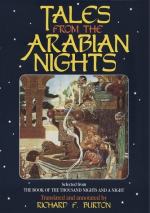*
*
* *
This is repeated three times, producing the same number of figures; and then the combination is sought in an explanatory table or, if the practitioner be expert, he pronounces off-hand. The Nights speak of a “Takht Raml” or a board, like a schoolboy’s slate, upon which the dots are inked instead of points in sand. The moderns use a “Kura’h,” or oblong die, upon whose sides the dots, odd and even, are marked; and these dice are hand-thrown to form the e figure. By way of complication Geomancy is mixed up with astrology and then it becomes a most complicated kind of ariolation and an endless study. “Napoleon’s Book of Fate,” a chap-book which appeared some years ago, was Geomancy in its simplest and most ignorant shape. For the rude African form see my Mission to Dahome, i. 332, and for that of Darfour, pp. 360-69 of Shaykh Mohammed’s Voyage before quoted.
[FN#300] Translators understand this of writing marriage contracts; I take it in a more general sense.
[FN#301] These lines are repeated from Night Ixxv.: with Mr. Payne’s permission I give his rendering (iii. 153) by way of variety.
[FN#302] The comparison is characteristically Arab.
[FN#303] Not her “face”: the head, and especially the back of the head, must always be kept covered, even before the father.
[FN#304] Arab. “Siwak"=a tooth-stick; “Siwa-ka"=lit. other than thou.
[FN#305] Arab. “Arak"=tooth stick of the wild caper-tree; “Ara-ka” lit.=I see thee. The capparis spinosa is a common desert-growth and the sticks about a span long (usually called Miswak), are sold in quantities at Meccah after being dipped in Zemzem water. In India many other woods are used, date-tree, Salvadora, Achyrantes, phyllanthus, etc. Amongst Arabs peculiar efficacy accompanies the tooth-stick of olive, “the tree springing from Mount Sinai” (Koran xxiii. 20); and Mohammed would use no other, because it prevents decay and scents the mouth. Hence Koran, chaps. xcv. 1. The “Miswak” is held with the unused end between the ring-finger and minimus, the two others grasp the middle and the thumb is pressed against the back close to the lips. These articles have long been sold at the Medical Hall near the “Egyptian Hall,” Piccadilly. They are better than our unclean tooth-brushes because each tooth gets its own especial rubbing’ not a general sweep; at the same time the operation is longer and more troublesome. In parts of Africa as well as Asia many men walk about with the tooth-stick hanging by a string from the neck.
[FN#306] The “Mehari,” of which the Algerine-French speak, are the dromedaries bred by the Mahrah tribe of Al-Yaman, the descendants of Mahrat ibn Haydan. They are covered by small wild camels (?) called Al-Hush, found between Oman and Al-Shihr: others explain the word to mean “stallions of the Jinns " and term those savage and supernatural animals, “Najaib al-Mahriyah” nobles of the Mahrah.




